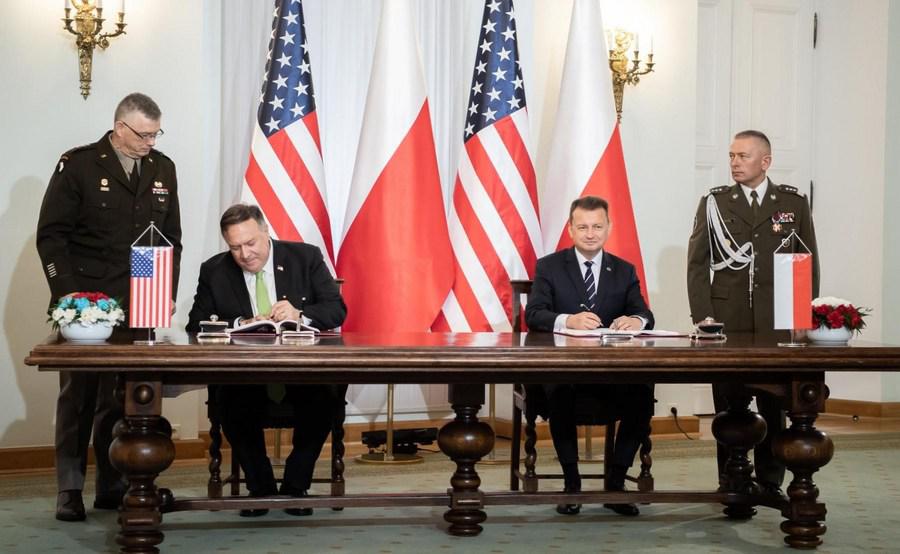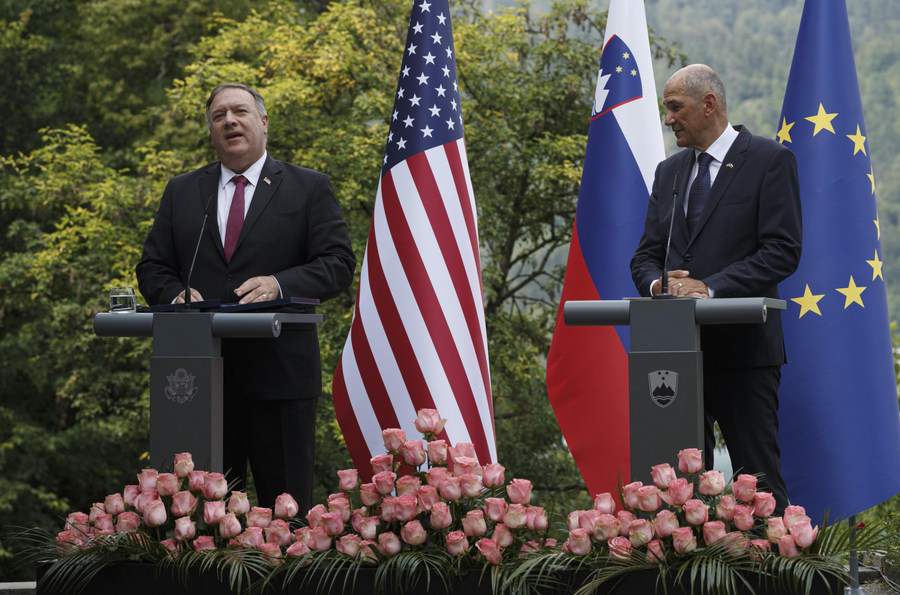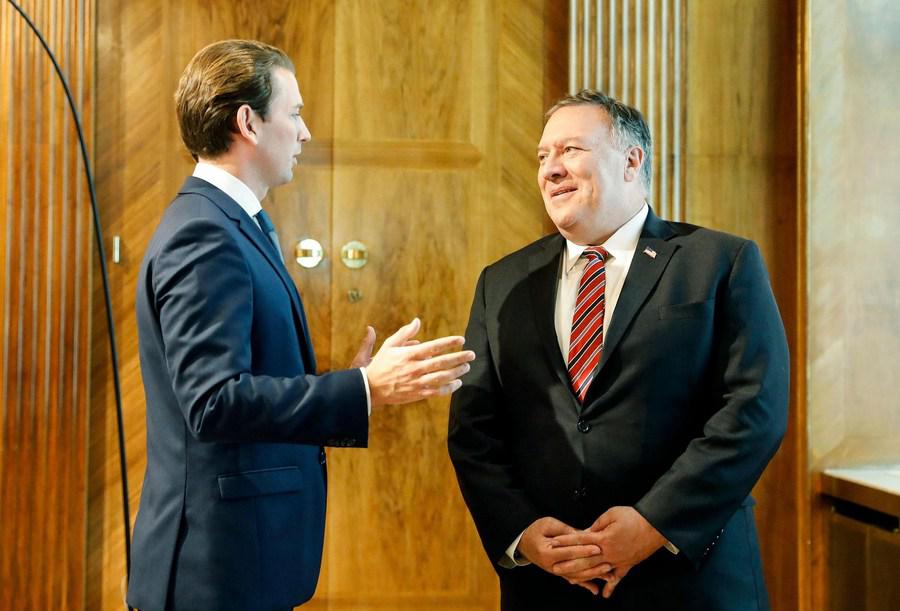

-- One of the focuses of Pompeo's journey was to form a European alliance against China and Russia.
-- Pompeo's anti-China rhetoric has found little support, while his attempt to divide Europe was met with criticism.
-- Pompeo had repeatedly used democracy and freedom as pretexts to promote the United States' own interests, and thus divide Europe into an old and a new bloc.
BERLIN, Aug. 17 (Xinhua) -- U.S. Secretary of State Mike Pompeo wrapped up his four-stop trip to Central and Eastern Europe after leaving Poland this weekend, probably with some disappointment.
During his stops in the Czech Republic, Slovenia, Austria and Poland, Pompeo spared no efforts preaching his China-bashing cliches, attempting to build an alliance against Beijing on the pretext of democracy and freedom.
However, his anti-China rhetoric has found little support, while his attempt to divide Europe was met with criticism.

U.S. Secretary of State Mike Pompeo (2nd L) and Polish Defense Minister Mariusz Blaszczak (2nd R) sign the Enhanced Defense Cooperation Agreement (EDCA) in Warsaw, Poland, on Aug. 15, 2020. (Polish Ministry of Defence/Handout via Xinhua)
ANTI-CHINA AGENDA FAILS
One of the focuses of Pompeo's journey was to form a European alliance against China and Russia. He asked the four countries to shun Huawei, the Chinese telecommunications giant considered a threat by Washington as it takes a lead in the 5G network, as well as Russia's energy supply to Western Europe.
During his journey, Pompeo repeatedly claimed that China and Russia are posing a threat to "the democratic world," saying that using technologies from China and Russia would pose a "danger" to the sovereignty of those countries.
However, Pompeo's rhetoric found little resonance and even rejections. At a joint press conference with Pompeo in Prague on Wednesday, Czech Prime Minister Andrej Babis called his country "a leader in Europe" on 5G and cybersecurity, saying that the Czech Republic is "a sovereign country and I do not see any major threat here."
On relations with China, Babis said that the Czech Republic "seeks lines with the European Union and there's no fundamental problem here," despite Pompeo's botched attempt to sow discord.
Babis told a Czech newspaper on Thursday that as a sovereign country, the Czech Republic treats countries equally. He also refused to rule out Huawei as a potential partner in 5G building despite Pompeo's push.
A similar scene played out in Vienna, Pompeo's third stop. At a joint press conference with his U.S. counterpart, Austrian Foreign Minister Alexander Schallenberg said that "our approach is not to ban in general one competitor or one provider, but to establish a clear list of criteria to avoid high-risk providers."
On the issue of 5G and cybersecurity, Austria shared similar stance as the Czech Republic. Schallenberg said that Vienna has adopted a common position within the EU, which is called the "EU toolbox."
Pompeo probably won some support in Slovenia, the country currently led by a populist government, and both countries signed a declaration on 5G security on Thursday which will exclude Huawei; however, it drew widespread criticism from both political and media circles.
"The signing of the political declaration on 5G security between Slovenian Foreign Minister (Anze) Logar and U.S. Secretary of State Pompeo does not follow Slovenia's interests," member of the European Parliament and member of the leadership of the Slovenian Social Democratic Party Milan Brglez said.
The Slovenian local newspaper Vecer carried a commentary on Friday, saying that Pompeo found a willing audience among Slovenian officials for U.S. plans to edge out Chinese competition in 5G telecommunications and contain Russia's energy expansion.
"We cannot get rid of the feeling that all that search for threats to human rights, secure communications, the rule of law and democracy is not about those values of Western civilization, but about who gets a bigger slice of the pie in this future business, and consequently controls the world," said the commentary.

U.S. Secretary of State Mike Pompeo (L) and Slovenia's Prime Minister Janez Jansa attend a press conference in Bled, Slovenia, Aug. 13, 2020. (Photo by Zeljko Stevanic/Xinhua)
MALICIOUS PLAN TO DIVIDE EUROPE
As the Slovenian newspaper said, it was about business interests. Besides Huawei, Pompeo had repeatedly used democracy and freedom as pretexts to promote the United States' own interests, and thus divide Europe into an old and a new bloc.
The Russia-Germany Nord Stream 2 gas pipeline project is definitely one of the key issues now between Europe and the United States, as Washington is worried that the project would strengthen Western Europe's energy dependence on Russia and thus expand Moscow's influence in Western Europe.
Critics of the U.S. sanctions have speculated that Washington is using the measures to enhance the sale of its own liquefied natural gas to Europe.
Pompeo raised the issue during his trip. In Vienna, Pompeo told reporters that he disagreed with Austria on the security threat posed by the project. Austria is one of the investors in the pipeline through the partly state-owned energy company OMV.
In response, Pompeo's Austrian counterpart and host Schallenberg told reporters that Vienna deeply regrets the "extraterritorial sanctions" imposed by the United States against the project. Austria's position is almost the same as Germany's, as Berlin is the biggest beneficiary of the project and also the fiercest accuser of U.S. sanctions.
"The federal government cannot be brought to its knees by the U.S. sanctions threats against the rightly controversial Nord Stream 2 pipeline," wrote the Austrian newspaper Die Presse. "In addition, it does not want to exclude Chinese companies like Huawei from setting up the 5G mobile network, even if the U.S. would like to do so," the newspaper said.
Pompeo also attempted to win a construction contract at the Czech Dukovany nuclear power plant for the American firm Westinghouse. However, the Czech Republic rejected his push to force a new memorandum.
U.S.-Poland defense cooperation is another thorn between Washington and Berlin, as well as between Warsaw and Berlin. On Saturday, Pompeo and Polish Defense Minister Mariusz Blaszczak signed the Enhanced Defense Cooperation Agreement (EDCA). It consists of the opening of a base in Poland for the U.S. army, probably in 2021. The total number of American soldiers will increase by 1,000 to around 5,500.
The strengthened U.S.-Poland defense cooperation came as Washington decided to withdraw around one third of its troops from Germany as a punishment for Berlin's incompliance with the North Atlantic Treaty Organization's (NATO's) 2 percent of gross domestic product defense spending standard and Nord Stream 2.
Germany depends on U.S. troops in security and economic terms and is angry about Washington's one-sided decision that did not involve consulting its allies. Meanwhile, as a new EU member, Poland is at odds with Germany and France due to Warsaw's judicial reforms. The closer ties between the United States and Poland have been considered by some observers as a U.S. strategy to weaken Europe.
"I believe that the U.S. move for sending some of the U.S. troops evacuated from Germany to Poland runs counter to the EU's unified foreign and security policy, and its motives are very suspicious," Sylwester Szafarz, a Polish expert on international issues, told Xinhua.

Austrian Chancellor Sebastian Kurz (L) meets with U.S. Secretary of State Mike Pompeo in Vienna, Austria, Aug. 14, 2020. (Dragan Tatic/BKA/Handout via Xinhua)
"This will not help Poland consolidate its position within the European Union, but also it is suspected that the United States is trying to divide the European Union further by pushing for a possible Polexit after Brexit," the expert said.

 Award-winning photos show poverty reduction achievements in NE China's Jilin province
Award-winning photos show poverty reduction achievements in NE China's Jilin province People dance to greet advent of New Year in Ameiqituo Town, Guizhou
People dance to greet advent of New Year in Ameiqituo Town, Guizhou Fire brigade in Shanghai holds group wedding
Fire brigade in Shanghai holds group wedding Tourists enjoy ice sculptures in Datan Town, north China
Tourists enjoy ice sculptures in Datan Town, north China Sunset scenery of Dayan Pagoda in Xi'an
Sunset scenery of Dayan Pagoda in Xi'an Tourists have fun at scenic spot in Nanlong Town, NW China
Tourists have fun at scenic spot in Nanlong Town, NW China Harbin attracts tourists by making best use of ice in winter
Harbin attracts tourists by making best use of ice in winter In pics: FIS Alpine Ski Women's World Cup Slalom
In pics: FIS Alpine Ski Women's World Cup Slalom Black-necked cranes rest at reservoir in Lhunzhub County, Lhasa
Black-necked cranes rest at reservoir in Lhunzhub County, Lhasa China's FAST telescope will be available to foreign scientists in April
China's FAST telescope will be available to foreign scientists in April